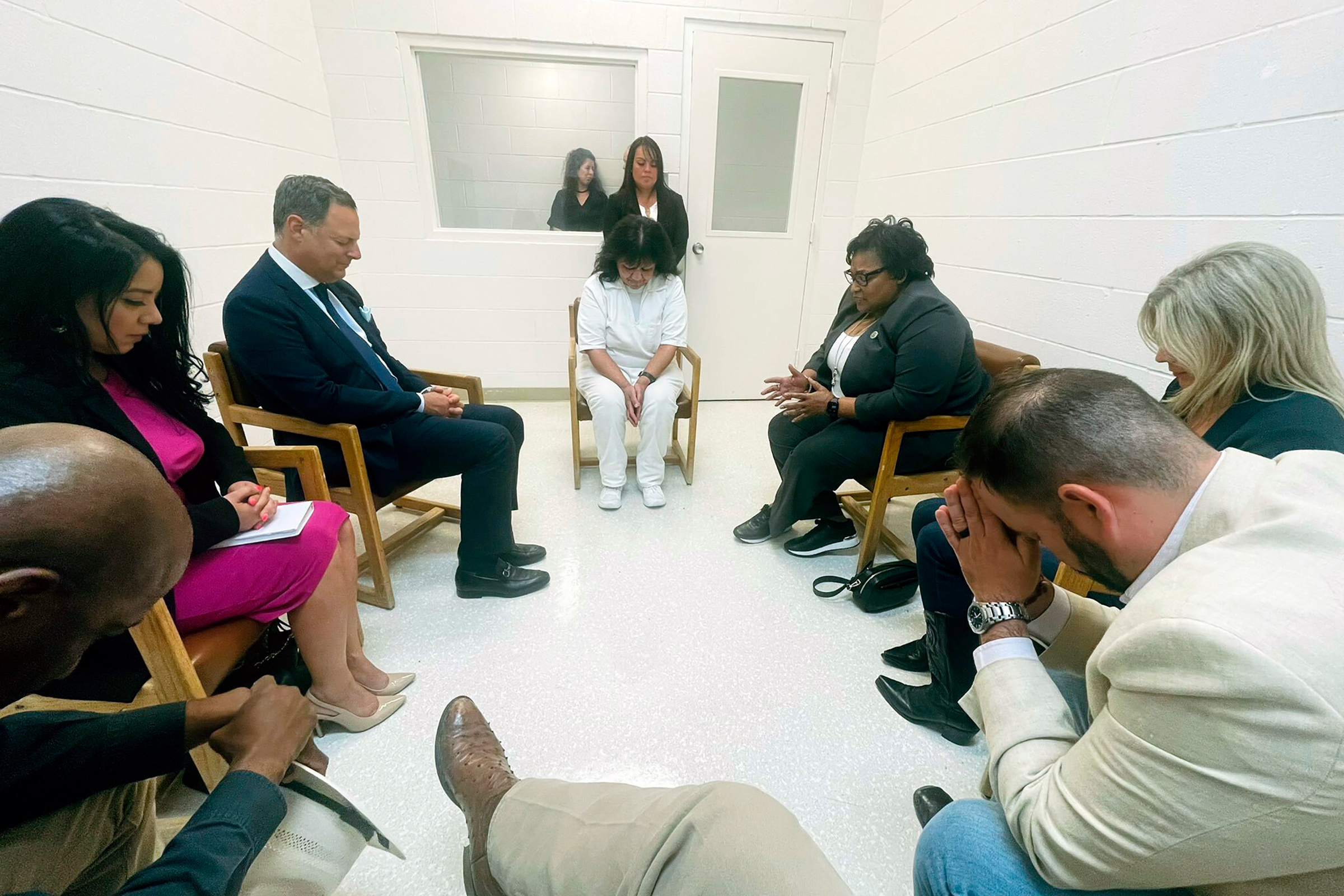
The highest criminal court in Texas on Monday halted the execution of Melissa Lucio—a mother whose murder conviction in the death of her 2-year-old daughter has come under increasing scrutiny amid doubts about her guilt.
Lucio, 53, was sentenced to be executed by lethal injection on April 27 for the 2007 death of her daughter, Mariah. But after the Texas Court of Criminal Appeals granted her a stay of execution, her case now heads to a lower court for a hearing which will consider new evidence.
“I thank God for my life. I have always trusted in Him. I am grateful the Court has given me the chance to live and prove my innocence. Mariah is in my heart today and always,” Lucio said in a statement provided by her lawyer later on Monday. If Lucio’s execution would have taken place, she would be the first Latina in the U.S. to be killed in such a manner since the death penalty was reinstated in 1976.
For now, Lucio and her family are looking forward to a new trial. “(Her family) is ecstatic. They’re relieved. They were suffering from so much fear and anxiety and they’re hopeful going forward that we will prove Melissa’s innocence and that she’ll be released,” says Tivon Schardl, one of Lucio’s attorneys.
What happened in the case and immediate aftermath?
On Feb. 15, 2007, 2-year-old Mariah died from injuries associated with a fall down a staircase leading to their apartment, according to Lucio and her children. (Lucio’s lawyers argue that Mariah had physical disabilities that made her walking unstable and led to a history of falls.) Two days later, the toddler did not wake up from a nap on her parents’ bed, they said. Prosecutors maintain that the girl’s body was covered in bruises and her death was due to abuse.
Police arrested Lucio; just two hours after her daughter’s death she had faced an interrogation in which her lawyers said “armed, male police officers stood over her, yelled at her, threatened her, berated her parenting, and repeatedly refused to accept anything less than an admission to causing her daughter’s death.” As a victim of sexual abuse and domestic violence, they said she was particularly vulnerable to law enforcement’s aggressive interrogation tactics. Lucio was convicted of beating her daughter to death partly based on statements she made during this interrogation.
“It’s just so clearly a case of coercive interrogation tactics,” says Schardl, one of Lucio’s attorneys, who has argued that Lucio asserted her innocence more than 100 times during the interrogation. Schardl also points out that in Texas an individual needs to be declared a future danger for the death penalty to apply but that Lucio had no history of violence.
On March 22, Lucio’s attorneys submitted a clemency application to the governor, which included declarations from experts highlighting issues with the confession and medical evidence. The confession was essentially a “regurgitation” of facts and words the officers told her during their interrogation and the evidence was consistent with the conclusion that Mariah died from medical complications from a fall, they said.
The clemency application also included declarations from five jurors who said they had serious concerns about evidence that had been withheld from them during trial and would support relief.

Who are Lucio’s supporters?
Lucio’s case has drawn widespread outrage from a bipartisan group of more than 100 Texas state lawmakers, as well as dozens of anti-domestic violence, religious and Latino groups and celebrities such as Kim Kardashian and John Oliver. They argue that medical evidence showing that Mariah’s death was consistent with an accident and a five-hour aggressive interrogation of a woman with a history of being abused should be reason enough to halt her execution.
Republican State Rep. Jeff Leach, who had been advocating for her clemency, was the one to deliver the news to Lucio in an emotional phone call, which was first reported by the Texas Tribune. “It was an overwhelming call for me. Probably a lot more overwhelming and joyful for her,” Leach tells TIME.
In a recording of the call, Lucio is heard laughing and crying as she asks: “Are you serious? Are you serious? When did this happen?”
Leach says that if Texas’ death penalty remains, policymakers need to consider reforms to ensure this doesn’t happen again.
“One thing that we can all agree on is that we deserve and expect and demand a government that we can trust and that’s fair and in Melissa’s case, I saw very clearly that the system failed her at every turn,” he says. “We cannot allow a system where a potentially innocent Texan can be killed.”
The systemic issue of false confessions
Criminal justice experts point out that the hostile interrogation tactics in Lucio’s case point to a more systemic problem. “Her case represents the tip of the iceberg. For every lucky one we catch, we discover there is some unknown number of false confessors still sitting in prison, because cases don’t get scrutinized,” says Saul Kassin, a psychology professor at John Jay College of Criminal Justice.
Out of more than 3,000 cases of exonerated individuals, about 12% involved false confessions, according to an April 2022 analysis by the National Registry of Exonerations; that number shot up to 34% when the exonerated defendant was under younger than 18 at the time of the crime and 69% if they were mentally ill or intellectually disabled. And of the more than 360 wrongful convictions in the U.S. that have been overturned by DNA evidence, almost 30% involved some kind of false confession, according to the Innocence Project.
The police’s coercive interrogation tactics are likely what led to Lucio’s confession, Kassin says. During the interrogation, she at one point said the words “I guess I did it” before being handed a doll she was instructed to hit it repeatedly.
“I can point to so many false confessions that began with the words, ‘it looks like I did it. Maybe I did it. I guess I did it.’ That’s not the language of memory. That’s the language of inference. I’m making an assumption that I did it because apparently, you have this evidence,” he says.
“After five hours of relentless badgering—given her state of mind—breaking down is not that surprising” adds Kassin.
More Must-Reads from TIME
- Cybersecurity Experts Are Sounding the Alarm on DOGE
- Meet the 2025 Women of the Year
- The Harsh Truth About Disability Inclusion
- Why Do More Young Adults Have Cancer?
- Colman Domingo Leads With Radical Love
- How to Get Better at Doing Things Alone
- Michelle Zauner Stares Down the Darkness
Write to Sanya Mansoor at sanya.mansoor@time.com